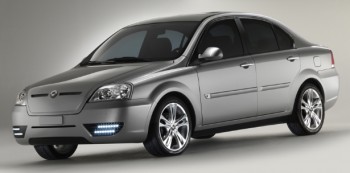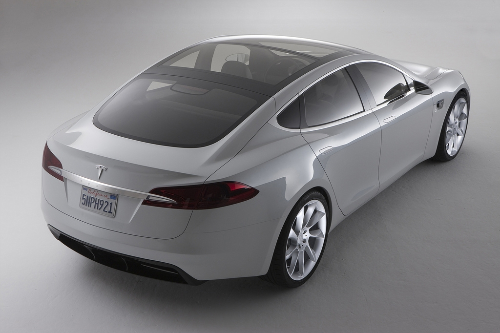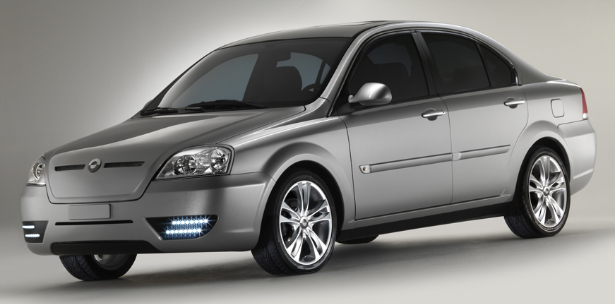Open one of those minimalist black boxes that contain a shiny new iPod and you’re greeted by five words — “Designed by Apple in California.” In much smaller print would be the phrase “Made in China.”
 Will Americans warm to a Chinese-built car when they can buy a domestic EV like the Chevy Volt for a similar price?Courtesy Coda AutomotiveThat, in a nutshell, describes the strategy of the latest entrant in the electric car sweepstakes: Santa Monica-based Coda Automotive. At a defunct Wilshire Boulevard Jaguar dealership on Wednesday, the startup emerged from stealth mode and CEO Kevin Czinger literally pulled the cover off the Coda, a $45,000 battery-powered sedan set to go on sale next year in California. Coda is an offshoot of Miles Electric Vehicles, a maker of low-speed “neighborhood electric” runabouts.
Will Americans warm to a Chinese-built car when they can buy a domestic EV like the Chevy Volt for a similar price?Courtesy Coda AutomotiveThat, in a nutshell, describes the strategy of the latest entrant in the electric car sweepstakes: Santa Monica-based Coda Automotive. At a defunct Wilshire Boulevard Jaguar dealership on Wednesday, the startup emerged from stealth mode and CEO Kevin Czinger literally pulled the cover off the Coda, a $45,000 battery-powered sedan set to go on sale next year in California. Coda is an offshoot of Miles Electric Vehicles, a maker of low-speed “neighborhood electric” runabouts.
The Coda sedan, which resembles a previous-generation Honda Civic, is a highway-ready, 80 mph five-seater that will travel 90 to 120 miles on a charge, according to the company.
And it is likely to be the first Chinese-made car to hit American roads. The car’s 333-volt lithium ion battery pack comes from the Tianjin Lishen Battery Joint-Stock Co., a huge state-owned corporation that supplies batteries to Apple and other consumer electronics companies. Coda has established a joint venture with Tianjin Lishen to design and sell batteries for transportation and utility storage. The sedan’s design, brand and intellectual property will be owned by Coda, but it will be manufactured and assembled in China by Hafei, a state-owned automobile and aircraft manufacturer.
“We asked whether we wanted to be in the manufacturing and mass assembly business, and we said in terms of capital and know-how, it doesn’t make sense for us to do that,” said Czinger in the sparse former Jaguar showroom where the floor-to-ceiling window shades were kept drawn. “Instead of building a large manufacturing organization and spending a lot of capital on building manufacturing capacity, we wanted to have speed to market, we wanted to have affordability.”
Coda will own 40 percent of the Tianjin Lishen battery joint venture in China and 60 percent of the operation outside that country. (Czinger said Coda has also formed an alliance with a U.S. battery maker, whom he declined to identify, and applied for a federal loan guarantee to build a factory in the United States.)
It’s very much early days in the nascent electric car market, but the California-China business model embraced by Coda may be a prelude to the future as the automotive center of gravity shifts “East” from Detroit. That the first Chinese-made car to hit the Great American Highway will be electric speaks volumes about where the auto industry is heading.
China offers a steady supply of batteries and low-cost manufacturing while Southern California long has been a design Mecca for major automakers seeking to tap Angelenos’ car-crazy zeitgeist. It’s no accident that venture capital-backed EV startups like Tesla Motors and Fisker Automotive have set up shop in the Golden State.
Those two companies have targeted the nosebleed end of the EV market, making sleek and sexy six-figure models that can induce drooling car lust in even non-gearheads.
Coda, like Norwegian electric carmaker Think, on the other hand, is staking its claim on the middle market — and therein lies the Coda conundrum. The Coda sedan may be “an all-electric car for everyone,” as Czinger puts it, but its sticker price is closer to BMW territory than Toyota’s. Even after state and federal incentives, it’ll still cost you in the mid-thirties for a car that could easily be lost in the supermarket parking lot amid look-alike Korean and Japanese commuter boxes.
 Tesla Motors isn’t going after middle class buyers with its incredibly expensive (and cool looking!) Model S, due out in 2012.Courtesy Tesla MotorsThe Coda may offer impressive technology, but it does not spark the gotta-have-it palpitations of Tesla’s upcoming Model S sedan, a low-slung head-turner with a projected base price $14,000 more than the Coda. Nor does it stand out from the pack like the forthcoming Chevy Volt electric hybrid that is supposed to sell for roughly the same price as the Coda.
Tesla Motors isn’t going after middle class buyers with its incredibly expensive (and cool looking!) Model S, due out in 2012.Courtesy Tesla MotorsThe Coda may offer impressive technology, but it does not spark the gotta-have-it palpitations of Tesla’s upcoming Model S sedan, a low-slung head-turner with a projected base price $14,000 more than the Coda. Nor does it stand out from the pack like the forthcoming Chevy Volt electric hybrid that is supposed to sell for roughly the same price as the Coda.
In an interview Czinger, a veteran of Goldman Sachs and online grocer Webvan, said Coda deliberately chose mild over wild, designing the car around a chassis currently in production in China so that it could focus on perfecting the battery system and drive train.
“We think commercializing an automotive-grade battery system will create a revolution,” said Czinger. “The next version of the car will look much different. It will use different materials and have different aerodynamics whose form is appropriate for an electric car.”
I took a short spin around Santa Monica in a prototype driven by a Coda product manager that still sported the Hafei logo on the steering wheel. As you would expect with an electric vehicle, it ran quietly and accelerated quick off the mark as power was instantaneously transferred to the wheels.
The car sported power windows, a navigation system and other features, but the fit and finish looked a bit rough-hewn and plastic fantastic. An automotive writer sitting in the back complained about the stitching in the faux-leather seats. Coda execs said the production model will feature an upgraded interior and such goodies as satellite radio, iPod dock, electronic stability control and a roadside assistance emergency button.
Any Chinese-built car to hit the U.S. market would face challenges with consumers concerned about quality, much as Korean automakers had a hard road to drive in the 1980s. Czinger said a team of Coda engineers is stationed at Hafei’s assembly plant to oversee quality control.
The first Codas will be sold to fleet operators in mid-2010, with consumer sales set to begin in the third quarter. The company expects to sell 2,700 cars by the end of the year and ramp up production to 20,000 in 2011. By then the Coda will face competition from a slew of electric cars expected to hit showrooms, including the Volt and electric versions of Renault-Nissan sedans and SUVs. The Tesla Model S is supposed to go to market in 2012.
While those manufacturers will only offer ever-changing price targets for their electric cars, Czinger says the Coda’s $45,000 sticker is not vaporware. “I’m giving you a price that’s based on an actual bill of materials,” he said.
Oh, and one more thing: You can have your Coda in any color you want … as long as it’s silver. Czinger has not decided yet whether to offer a full palette on a car that comes with no options other than a home fast-charging station.
—
Watch a promotional video for the Coda Sedan below:
Read more Green State columns by Todd Woody.



